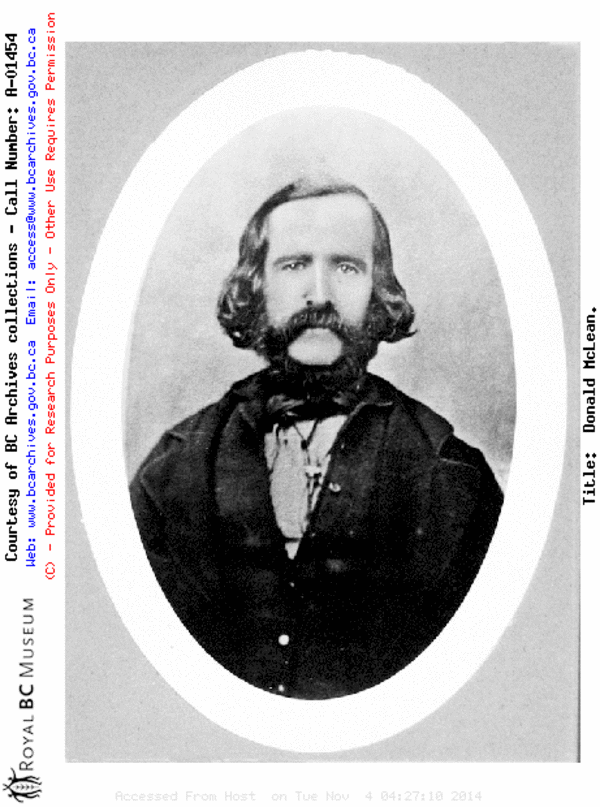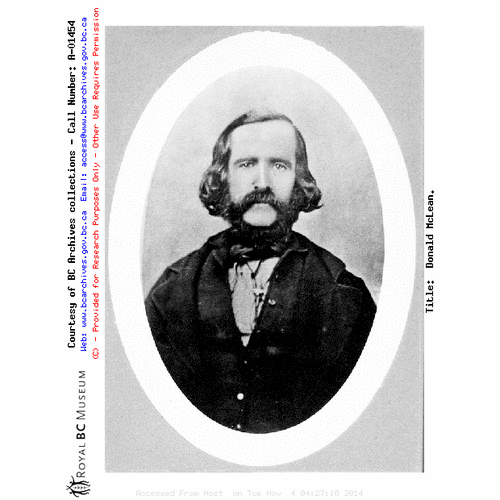
Source: Link
McLEAN, DONALD, HBC chief trader and cattle rancher; b. 1805 in Tobermory, Isle of Mull, Scotland; d. 17 July 1864 in Chilcotin, B.C.
Donald McLean, a tall and powerful red-head, joined the Hudson’s Bay Company in 1833 as apprentice clerk, serving in the Western Department for two years. He then joined expeditions in the Snake River country (Oreg.) under Thomas McKay and John McLeod*. In 1839 he was moved to Fort Colvile (near present-day Kettle Falls, Wash.) under Archibald McDonald*, and next year was promoted clerk at Flathead Post (Mont.); here he lived with a Spanish-Indian girl, from whom he separated in 1853 or 1854.
He was transferred to New Caledonia District in 1842, taking charge at times of the Chilcotin, Babine, and McLeod posts, and working at Fort Alexandria on the Fraser River under Donald Manson*. This district was the “Siberia of the fur-trade”; troublesome servants were moved here to cool off in the harsh climate on rations of three dried salmon daily. The men were rough and tough, as was the discipline meted out to them. Governor George Simpson* was thoroughly justified in condemning the “club law” enforced by Manson, McLean, and Paul Fraser, but perhaps reasonable methods had failed.
Sometimes, quite inexcusably, violence was extended towards Indians by fur traders. In 1849 the Indian Tlelh killed Alexis Bélanger, a Métis in the HBC service, after considerable provocation. McLean, who was at that time at Alexandria, headed an unsuccessful manhunt, venting his spleen on Tlelh’s relations by killing two men and a baby. He wrote to Manson of those sheltering Tlelh: “The black, ungrateful, blood-thirsty, treacherous, and cowardly scoundrels should have prompt justice for it; hang first, and then call a jury to find them guilty or not guilty.” His superiors apparently accepted this attitude. The Indians remembered it as their dislike for the white invaders, and particularly McLean, increased.
In 1853 McLean was appointed chief trader, and two years later took charge of Thompson’s River Post (Kamloops) when Fraser died. Here he improved horsebreeding and developed larger cattle herds; he also, with his growing sons, amassed livestock of his own. He soon was aware of gold in the area but the HBC suppressed news of it until 1857, when the fur trade autocrats gradually yielded to mining and colonial interests.
A naval officer, Lieutenant Richard Charles Mayne, visiting Kamloops in 1859 praised McLean: “A finer or more handsome man I think I never saw.” But HBC officials were not so impressed by his growing high-handedness, and he was ordered to headquarters at Victoria in 1860. He resigned the next year. The McLean clan moved their livestock to grasslands on the Bonaparte River; here they ranched, prospected, and ran “McLean’s Restaurant” for travellers in the Cariboo country. Donald McLean had married Sophia Grant, a Colville Indian, at Fort Colvile in 1854, and now had a second family. He was apparently devoted and indulgent to all his children. The deaths of two moved him to verse of gentle resignation, contrasting strongly with his harsh public character.
During 1864 Chilcotin Indians, seemingly provoked by unprincipled private traders, the ravages of diseases introduced by the white men, and the probability of reserves being established, killed some 19 members of work parties building a road inland from Bute Inlet for Alfred Penderell Waddington*. Panic arose in Victoria, where a large-scale uprising was feared. A mass meeting there urged that “Captain McLean” lead a “Chilcoaten” expedition of vengeance, and he duly left the Bonaparte River, ostensibly under William George Cox*’s command. But, a self-confident individualist to the end, McLean scouted almost alone and was killed in an ambush. The murderers of the workmen were induced to surrender, but McLean’s slayer was sheltered by the Indians, who regarded his act as a just retribution for his victim’s life of cruel violence.
McLean’s older children became worthy settlers, but the three youngest, Allan*, Charley, and Archie, wild half-breeds disclaimed by both Indians and the immigrant white society, eventually ran berserk, and were hanged for murdering a constable in 1879. Ironically, the son of one was decorated in 1917 for bravery in killing 19 Germans single-handed.
Kamloops Museum (Kamloops, B.C.), HBC journals, 1859–60; HBC letters, 1879. PABC, Donald McLean, miscellaneous papers. R. C. Mayne, Four years in British Columbia and Vancouver Island: an account of their forests, rivers, coasts, gold fields, and resources for colonisation (London, 1862), 115–21. Daily British Colonistand Victoria Chronicle, 4 Nov. 1863; 3, 4, 6, 30 June, 7, 11 July, 1, 8, 25 Aug. 1864; 11, 13, 14, 16, 18, 28 Dec. 1879; 1, 20 Jan., 16, 19, 20 March, 19 Nov. 1880. Morice, History of northern interior of B.C. (1904), 233, 239, 264–69, 272, 311. Mel Rothenburger, “We’ve killed Johnny Ussher!”: the story of the wild McLean boys and Alex Hare (Vancouver, 1973), 3–21. “German killer returns home; Kamloops crowd meets hero of Vimy Ridge who was awarded DCM,” Kamloops Telegram (Kamloops, B.C.), 11 Oct. 1917.
Cite This Article
Mary Balf, “McLEAN, DONALD,” in Dictionary of Canadian Biography, vol. 9, University of Toronto/Université Laval, 2003–, accessed December 30, 2025, https://www.biographi.ca/en/bio/mclean_donald_9E.html.
The citation above shows the format for footnotes and endnotes according to the Chicago manual of style (16th edition). Information to be used in other citation formats:
| Permalink: | https://www.biographi.ca/en/bio/mclean_donald_9E.html |
| Author of Article: | Mary Balf |
| Title of Article: | McLEAN, DONALD |
| Publication Name: | Dictionary of Canadian Biography, vol. 9 |
| Publisher: | University of Toronto/Université Laval |
| Year of publication: | 1976 |
| Year of revision: | 1976 |
| Access Date: | December 30, 2025 |



